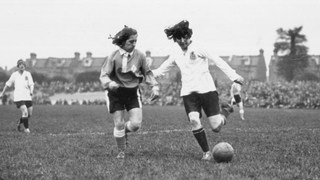I will wager that on Sunday 31 July 2022, I was the only person in the 87,192 strong Wembley crowd who could also claim to have been at the inaugural meeting of the Women’s F.A. in November 1969 and at the first official England women’s international on 18 November 1972. I look forward to learning of any challenge to that claim!
As a 15 year old, I finally persuaded my Spurs supporting father to take me with him to White Hart Lane. Unfortunately I have no idea who the opposition was on that day but I clearly remember on a later occasion accompanying Dad to Tottenham Town Hall to witness the victorious men’s team bring back the FA. Cup after their victory over Chelsea in 1967. As we stood in that crowd a thought occurred, “why don’t girls play football”. Well, women have actually played football in the United Kingdom since at least the 1880s and the munitions factories of the First World War provided many women with the opportunity to play the sport. It was 1921 when The Football Association voted to ban women from playing on pitches under their control or to use official referees, a rule which would prevent me, in the 1960s, from hiring facilities from my local Council. Following up my thought, I wrote to the local newspaper (no internet or mobile ‘phones in 1967) and asked the question I had posed myself. The paper published a photo of me, and girls responded applying to join my team.
There was nothing for it but to form a team – we gathered in my parents’ front room and resolved to do just that. As the newly elected Chairman, I rang the Council only to be given the news that facilities were not available to us because of the 1921 rule. This was an example of the rule being regularly misinterpreted but we were not deterred. Another letter to the paper and this time a men’s team, White Star of Tottenham invited us to share their training facilities. An advert in a soccer magazine brought invitations to play boys and men’s team on their pitches but the most important contact came from Arthur Hobbs who was running, that summer, a tournament for 8 women’s teams in Deal, Kent. Too late to enter, we visited the event and made our first contact with other women’s teams. Out of that tournament which ran for several years, steadily growing in participation, came the formation of regional leagues and on 1 November1969 the inaugural meeting of the Women’s F.A. – the culmination of Arthur’s determination and a lot of hard work by so many foresighted men and women. The establishment of the WFA was done originally by volunteers and only in 1981 could we afford, through grants, to open an office with a single employee.
We have now seen more than 50 finals of the national women’s cup competition which began in season 1970/71 and last week we witnessed a moment which none of those there at the beginning of the WFA could ever have imagined. As I walked up Wembley Way towards the “new” stadium I took in the UEFA signage and banners, and my first sight of a nearly-full stadium was an emotional moment. Tears in the eyes welled during the national anthem as they did at the end of a final where, for a minute or two, I feared that we were again heading for penalties just as in that first European final in 1984 when England eventually lost to Sweden.
The WFA soldiered on until 1993 when its parlous financial state meant that the time was right to hand over our sport to The F.A. and they were ready to receive us. The years since have seen huge financial and organisational investment in the women’s game. We tried to get it established in schools all those years ago and it would seem that this journey still continues for The F.A. as barely more than fifty per cent of schools offer girls the same opportunity as their brothers. Investment must be made here and also at the grassroots because without that this beautiful new flower will wilt. I don’t believe it will die but the European success must be harnessed to ensure that we make the progress this win demands and the work of those who went before is honoured.





